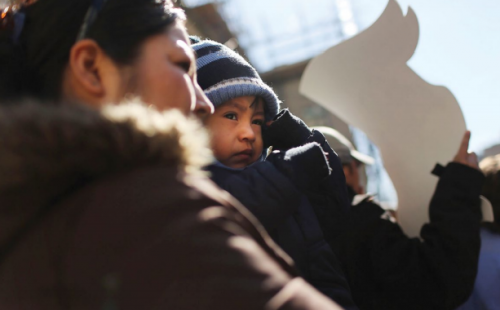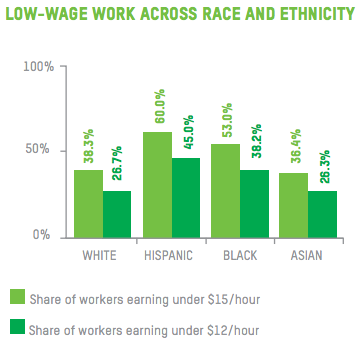 The really good news: Seventy-four percent of respondents (including 58 percent of Republicans) said they back boosting the minimum wage from its current level of $7.25 an hour to $9 over the course of two years, according to a poll this year.
The really good news: Seventy-four percent of respondents (including 58 percent of Republicans) said they back boosting the minimum wage from its current level of $7.25 an hour to $9 over the course of two years, according to a poll this year.
Another poll shows that 48% of Americans favor raising the minimum wage to $15 an hour.
The bad news: Our politicians are not responding to the wishes of the people. Rather, the Senate tax bill just passed actually increases inequality and hurts the working poor.
If you or you and your spouse make less than $10,000 a year, under the Senate tax bill, you will need to pay $80 more in taxes in 2019.
If you make more than $1,000,000 a year, you will pay $59,615 less in taxes that year.
Eight years later, everyone making $75,000 or less will be paying for this massive redistribution of wealth from poor and working class people to the wealthy 1% of the population. (Statistics from Congressional Budget Numbers – article)
The Senate and House bills must be reconciled in conference committee, and the GOP hopes to have a vote before the year end.
 Good news: The Presbyterian Church (U.S.A.) just announced our full participation in the Poor People’s Campaign: A National Call for Moral Revival. This campaign represents part of our longstanding work to be in solidarity with poor and working class people, and builds on our recent General Assembly Overture on Choosing to be A Church Committed to the Gospel of Matthew 25, which:
Good news: The Presbyterian Church (U.S.A.) just announced our full participation in the Poor People’s Campaign: A National Call for Moral Revival. This campaign represents part of our longstanding work to be in solidarity with poor and working class people, and builds on our recent General Assembly Overture on Choosing to be A Church Committed to the Gospel of Matthew 25, which:
Encourages congregations, mid-council governing bodies and national agencies of the PC(USA) to locate ourselves with the poor, to advocate with all of our voice for the poor, and to seek opportunities to take risks for and with the poor.
At the launch yesterday, Rev. Denise Anderson, Co-Moderator of the 222nd General Assembly, spoke of the need to respond to the profound crisis of these times by building a nationwide multiracial movement calling for dramatic steps to address the evils of racism, poverty, the war economy and environmental destruction. With the Poor People’s Campaign, we are mobilizing toward 40 days of massive, coordinated, nonviolent direct action across the country this spring.
Pledge to join the Campaign and read more from the Office of Public Witness.
Why is the campaign needed?
Because working people in our country are hurting due to inadequate wages and few benefits. People simply lack the money to provide for themselves and their families. This is the primary reason why 41 million people, including 13 million children, struggle with hunger.
 Wages have stagnated. Over 41 million workers earn under $12 an hour and 58 million workers earn under $15 an hour—wages that are too low for families to thrive.
Wages have stagnated. Over 41 million workers earn under $12 an hour and 58 million workers earn under $15 an hour—wages that are too low for families to thrive.- Millions labor with threadbare benefits. For example, 80 percent of low-wage workers do not have any earned sick leave.
- The Earned Income Tax Credit, which President Ronald Reagan called “the best anti-poverty, the best pro-family, the best job creation measure to come out of Congress,” fails to reach many of our lowest-paid workers.
The answer to this chronic structural problem is a raise for the working poor. In their new report titled Few Rewards: An Agenda to give America’s Working Poor a Raise, the Economic Policy Institute and Oxfam USA sketch out a 4-point agenda:

See bigger versions of this and other charts in the Few Rewards report
- Raise the federal minimum wage
- Provide access to earned sick leave
- Protect overtime pay for millions of workers
- Expand the Earned Income Tax Credit (EITC)
PHP pays special attention to those people working in the food system — farm workers, farmers, foodprocessing plant workers, shippers, distribution workers, food retail and restaurant workers, including waitstaff whose minimum wage is still $2.13 an hour. These workers comprise approximately 20 million workers in the US. Food preparation workers and servers make only $18,910 a year (annual median wage; from Bureau of Labor Statistics, May 2015) Nearly all food chain workers would be hurt by the tax bill being considered, when what they really need is a raise.
Few Rewards argues that the time for these reforms is now, and your Office of Public Witness and Presbyterian Hunger Program are working in coalition for such changes. Write us at php@pcusa.org to learn how you can help out. And don’t miss out on giving financial support for faith-based advocacy and coalition-building in your end-of-year giving. Donate to OPW and PHP!